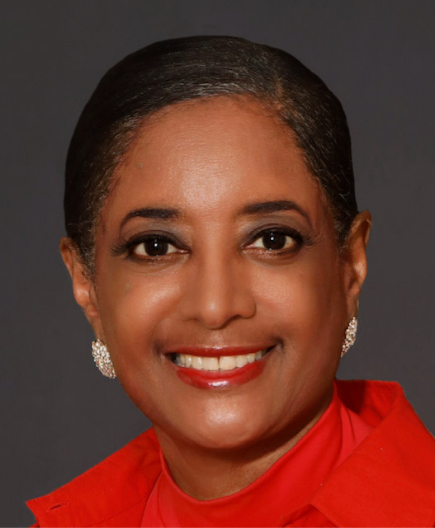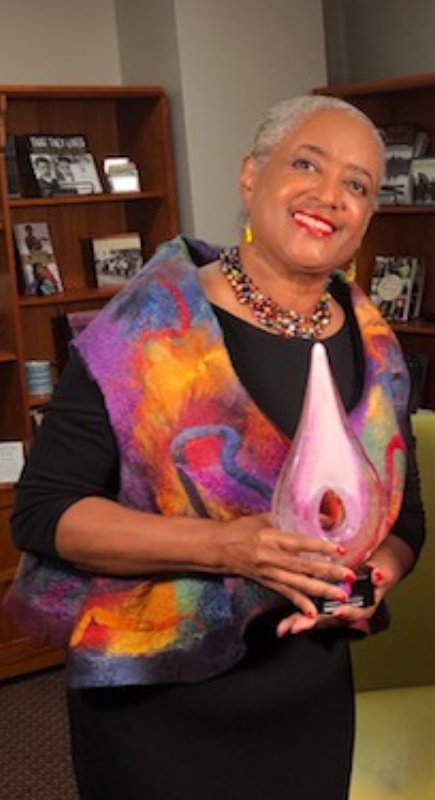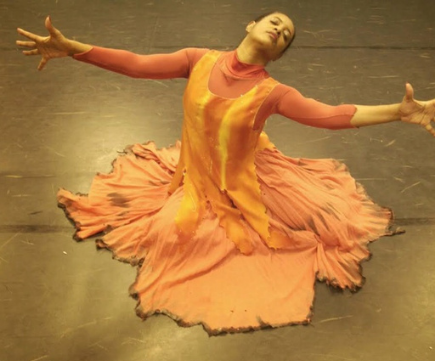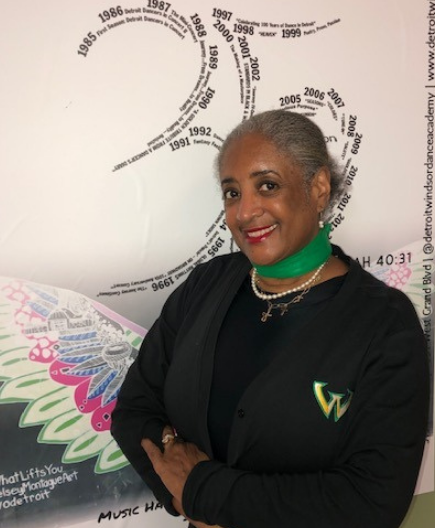Alumna dances into Michigan Women’s Hall of Fame

When she was 10, Debra White-Hunt (M.Ed. '79) went from hitting pitches to doing pliés. After playing a softball game at Kronk Recreation Center, she became fascinated by a dance class. White-Hunt was so mesmerized that her father signed her up for lessons.
“My cousins and I would walk to Kronk on Saturdays for class,” she said. “They tease me to this day because I am the only one that stuck with dancing.”
White-Hunt’s perseverance paid off. Next month, she will be inducted into the Michigan Women’s Hall of Fame in recognition of her leadership, service to the community and efforts to empower women and girls through dance. The virtual ceremony will be held at noon on Oct. 26.
While excited about the induction, White-Hunt said she is humbled by the recognition, particularly because her work has always been about helping others find and use their gifts.
“I am honored that people think enough of me to acknowledge my work in this way,” she said. “When I was a little girl, I was trying to reach a goal that had not been accomplished by many others. Pursuing a career in dance was out of the ordinary, but it was in my heart, and it drove and inspired me. I just wanted to create opportunities for the next generation to fulfill their dreams, particularly if they had dreams that others believed were not ordinary. Those seeds need to be nurtured because we all have something special that will serve us and the greater community.”

A Detroit native, White-Hunt remembers gathering at the houses of family members or friends after church, enjoying breakfast and dancing until the street lights came on. In junior high school, she and her friends created dance routines and participated in talent shows. She took dance classes at Mumford High School, where she was also involved in cheerleading and other sports. She began college at Michigan State University as a medical technology major — but soon felt compelled to dance.
“Dance was in my heart, so I decided to change my major,” said White-Hunt. “The closest I could get was to major in theatre and minor in dance. I don’t think my parents were thrilled about it, but they realized how happy I was and how much I really wanted to be a dancer.”
White-Hunt earned dance scholarships from Arthur Mitchell and Alvin Ailey, further cementing her desire to dance. With dreams of getting into a dance company and traveling the world as a professional dancer, she moved to New York to study dance after graduating from college.
Then tragedy struck. White-Hunt’s grandmother was killed in a car accident in Detroit. Devastated, she returned home.
A friend encouraged her to pursue a master’s in education. White-Hunt said the only place she wanted to teach was in the Detroit Public Schools because she wanted to serve her community. However, she was told she couldn't teach dance in the Detroit Public Schools with a master’s and a dance certification — she also needed a physical education certification. At the time, White-Hunt said, Wayne State did not offer a physical education certification, but the university arranged for her to earn hers through Michigan State while working toward her graduate degree.
“I chose Wayne State because it was always a part of our family,” she said. “My mother, aunt, many of their friends and several members of my sorority had attended Wayne State. I knew a lot about the university, and everyone I knew who went there said great things about it.”
White-Hunt was concerned about paying for her graduate degree. She said it was a blessing to earn a Graduate Professional Scholarship, which allowed her to finish her studies. She also benefitted from a loan repayment program for students who taught in urban school districts.
White-Hunt said her time at Wayne State helped her in many ways. She learned more about education, what it was, why it was important and how it could change lives. She also had the opportunity to explore many areas in which she was interested but previously did not have time to study.
“Art was my cognate,” she said. “I took a ceramics class. I was intrigued that we were able to take a piece of clay and use our hands to create something beautiful. It was calming, peaceful and spiritual. That experience helped me connect with other artists and creators. The many physical education classes, including fencing and billiards, I took were fun, and they helped me understand how people think and learn differently.”
White-Hunt said her dance classes were not like the ones she took during her undergraduate program and in New York.
“They were more centered on an educational vein,” she said. “I began to see and understand myself more as a dance educator.”

White-Hunt taught dance at more than 20 schools in Detroit, including Martin Luther King Jr. Senior High School, Northwestern High School, Central High School and Ruddiman Middle School. She was disappointed that she often started a dance program at one school only to get laid off or transferred to another one. After getting laid off one time, White-Hunt returned to New York. She danced with some small companies then began wondering if she had what it took to become a professional dancer.
“New York was over my head,” she said. “I had missed the city, but I hadn’t been dancing — I had been teaching. And I started my dance training in college, later than many professionals.”
White-Hunt returned to Detroit, and she and Bruce Hunt, her boyfriend of eight years, got married. She said she eventually realized that her path was part of God’s plan.
“Everybody in the school knows the dance teacher because there is usually only one of us,” White-Hunt said. “I met and got to know many staff members, students and parents. Years later, when they wanted to dance or enroll their children in dance, they remembered me. I attended a Detroit Public Schools All-City Dance Concert recently, and most of the dance teachers there had taught at only one school. I realized moving around as often as I did helped me get to where I am today.”
White-Hunt is happy she has been able to be a mentor and advisor to several students, many of whom have also become dance educators.

“I am a proud Wayne State alumna,” she said. “I encouraged many of my dance students to consider the university. Some enrolled and earned dance scholarships. Some were not able to go away to school and didn’t realize what a great university Wayne State is, and now they can also say they are graduates.”
White-Hunt said the most important thing aspiring educators must do is understand that teaching is about meeting the needs of students.
“People must become educators for the right reason — to give back to the young people coming after them,” she said. “It is all about the students. Be patient with them. Know who your students are, what their needs are and how they learn so you can reach all students in your class. Give your students your best. Dance educators must continue learning, growing and training. As our bodies change, we access our knowledge and pass it on to our students differently. My dancing at 20 is totally different than my dancing at 70.”
White-Hunt and her husband formed the Detroit-Windsor Dance Academy — which she refers to as their “love child”— as a result of her time as a dance teacher at Bates Academy. She serves as co-founder and artistic director, and he is co-founder and executive director.
“I worked with a group of dancers at Bates that were so amazing, and we had such a wonderful connection,” she said. “They were like sponges, soaking up everything I taught them. When the summer came, we wanted to continue working together.”
White-Hunt found an affordable studio space downtown in Detroit’s Harmonie Park, and the group continued rehearsing. When the summer ended, she learned she had been transferred again, but she and the students wanted to stay together. White-Hunt and her husband took a leap of faith. They both left their jobs to run the academy, which continued to grow. Many of White-Hunt’s friends wanted to take dance to stay in shape. Others wanted her to teach their children to dance.
“We started teaching adult and beginner classes,” she said. “As the children grew, they continued to take dance. Then, when they started their own families, they brought their children to me for lessons, so many different generations were being served and given the opportunity to dance.”
Now in its 38th year of operation, the Detroit Windsor Dance Academy has touched the lives of more than 15,000 students. A 501(c)(3) organization, the academy trains students from two through 95 in all disciplines of dance and dance ministry.
White-Hunt has been a dancer and dance educator for more than 60 years. She has choreographed more than 50 ballets, produced and directed more than 100 dance concerts, developed training programs and tools for dance students, and created pieces for the stage, television, film, and video. White-Hunt has received many awards and accolades. She was named a John F. Kennedy Center Arts Fellow, Kresge Artist Fellow, Michiganian of the Year, and Milken National Educator. A recipient of an Essence Award, she has also been honored as one of Crain’s Notable Women in Non-Profits and Michigan Dance Association Teacher of the Year.
White-Hunt said she has achieved so much because of the support she received from many people, including her husband, her family and friends, and her sorors of Delta Sigma Theta Sorority, Incorporated. White-Hunt, who also has a diploma in Christian education, said her faith contributed to her success.
“It is important to acknowledge God and the many people who helped mold me into the person I am today,” said White-Hunt. “We're not in this world alone. I remember when it was just me, Bruce and the record player in our little loft. He would say, ‘We are ready, and people will come’ — and they came and continued to return. Our ability to do the work we love for so long is a blessing.”
All photos provided courtesy of Debra White-Hunt
by Tracy A. Boyce